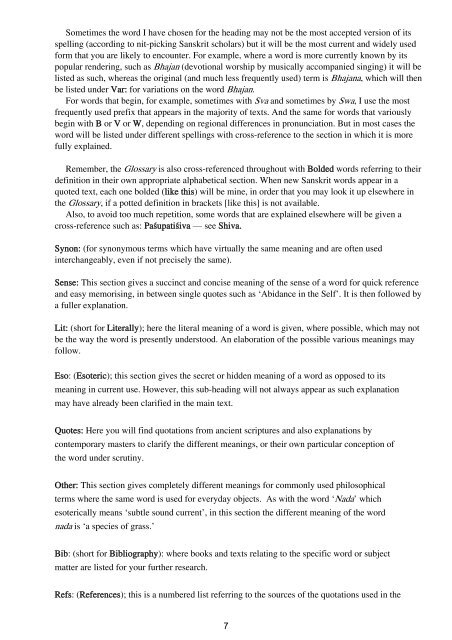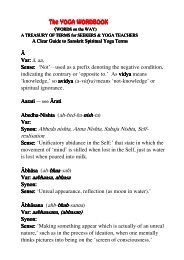Words on the Way - Muz Murray Mantra Yoga Master
Words on the Way - Muz Murray Mantra Yoga Master
Words on the Way - Muz Murray Mantra Yoga Master
You also want an ePaper? Increase the reach of your titles
YUMPU automatically turns print PDFs into web optimized ePapers that Google loves.
Sometimes <strong>the</strong> word I have chosen for <strong>the</strong> heading may not be <strong>the</strong> most accepted versi<strong>on</strong> of its<br />
spelling (according to nit-picking Sanskrit scholars) but it will be <strong>the</strong> most current and widely used<br />
form that you are likely to encounter. For example, where a word is more currently known by its<br />
popular rendering, such as Bhajan (devoti<strong>on</strong>al worship by musically accompanied singing) it will be<br />
listed as such, whereas <strong>the</strong> original (and much less frequently used) term is Bhajana, which will <strong>the</strong>n<br />
be listed under Var: for variati<strong>on</strong>s <strong>on</strong> <strong>the</strong> word Bhajan.<br />
For words that begin, for example, sometimes with Sva and sometimes by Swa, I use <strong>the</strong> most<br />
frequently used prefix that appears in <strong>the</strong> majority of texts. And <strong>the</strong> same for words that variously<br />
begin with B or V or W, depending <strong>on</strong> regi<strong>on</strong>al differences in pr<strong>on</strong>unciati<strong>on</strong>. But in most cases <strong>the</strong><br />
word will be listed under different spellings with cross-reference to <strong>the</strong> secti<strong>on</strong> in which it is more<br />
fully explained.<br />
Remember, <strong>the</strong> Glossary is also cross-referenced throughout with Bolded words referring to <strong>the</strong>ir<br />
definiti<strong>on</strong> in <strong>the</strong>ir own appropriate alphabetical secti<strong>on</strong>. When new Sanskrit words appear in a<br />
quoted text, each <strong>on</strong>e bolded (like this) will be mine, in order that you may look it up elsewhere in<br />
<strong>the</strong> Glossary, if a potted definiti<strong>on</strong> in brackets [like this] is not available.<br />
Also, to avoid too much repetiti<strong>on</strong>, some words that are explained elsewhere will be given a<br />
cross-reference such as: Paçupatiçiva — see Shiva.<br />
Syn<strong>on</strong>: (for syn<strong>on</strong>ymous terms which have virtually <strong>the</strong> same meaning and are often used<br />
interchangeably, even if not precisely <strong>the</strong> same).<br />
Sense: This secti<strong>on</strong> gives a succinct and c<strong>on</strong>cise meaning of <strong>the</strong> sense of a word for quick reference<br />
and easy memorising, in between single quotes such as ‘Abidance in <strong>the</strong> Self’. It is <strong>the</strong>n followed by<br />
a fuller explanati<strong>on</strong>.<br />
Lit: (short for Literally); here <strong>the</strong> literal meaning of a word is given, where possible, which may not<br />
be <strong>the</strong> way <strong>the</strong> word is presently understood. An elaborati<strong>on</strong> of <strong>the</strong> possible various meanings may<br />
follow.<br />
Eso: (Esoteric); this secti<strong>on</strong> gives <strong>the</strong> secret or hidden meaning of a word as opposed to its<br />
meaning in current use. However, this sub-heading will not always appear as such explanati<strong>on</strong><br />
may have already been clarified in <strong>the</strong> main text.<br />
Quotes: Here you will find quotati<strong>on</strong>s from ancient scriptures and also explanati<strong>on</strong>s by<br />
c<strong>on</strong>temporary masters to clarify <strong>the</strong> different meanings, or <strong>the</strong>ir own particular c<strong>on</strong>cepti<strong>on</strong> of<br />
<strong>the</strong> word under scrutiny.<br />
O<strong>the</strong>r: This secti<strong>on</strong> gives completely different meanings for comm<strong>on</strong>ly used philosophical<br />
terms where <strong>the</strong> same word is used for everyday objects. As with <strong>the</strong> word ‘Nada’ which<br />
esoterically means ‘subtle sound current’, in this secti<strong>on</strong> <strong>the</strong> different meaning of <strong>the</strong> word<br />
nada is ‘a species of grass.’<br />
Bib: (short for Bibliography): where books and texts relating to <strong>the</strong> specific word or subject<br />
matter are listed for your fur<strong>the</strong>r research.<br />
Refs: (References); this is a numbered list referring to <strong>the</strong> sources of <strong>the</strong> quotati<strong>on</strong>s used in <strong>the</strong><br />
7



